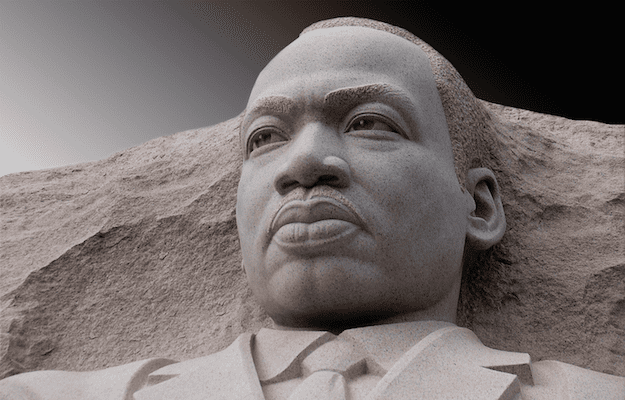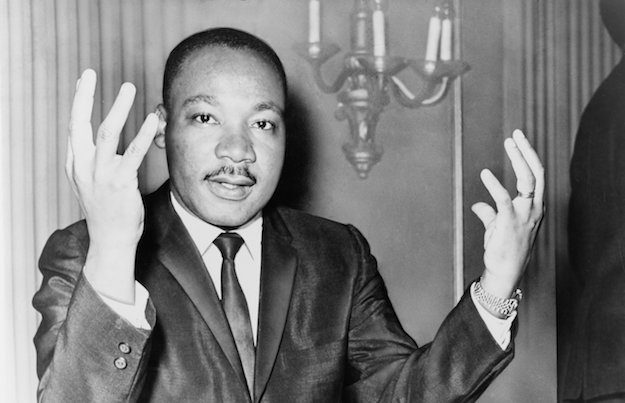Rev. Dr. Martin Luther King Jr. is one of my greatest influences. Yesterday our nation celebrated him! In sharing my (lightly-edited) sermon from Sunday’s worship service which honored Dr. King, I hope to inspire and challenge us. Most of all, I hope to reclaim King from the ways that he has regularly been sanitized and domesticated in our society since his death. Read, reflect, comment and share! (I posted this originally at The Blackburn House blog.)
The Voice of Vocation
The title of my message is “The Voice of Vocation.” Our Old Testament lesson comes from 1 Samuel 3:1-10.
1 Samuel 3:1-10 (NLT)
3 Meanwhile, the boy Samuel served the Lord by assisting Eli. Now in those days messages from the Lord were very rare, and visions were quite uncommon.
2 One night Eli, who was almost blind by now, had gone to bed. 3 The lamp of God had not yet gone out, and Samuel was sleeping in the Tabernacle near the Ark of God. 4 Suddenly the Lord called out, “Samuel!”
“Yes?” Samuel replied. “What is it?” 5 He got up and ran to Eli. “Here I am. Did you call me?”
“I didn’t call you,” Eli replied. “Go back to bed.” So he did.
6 Then the Lord called out again, “Samuel!”
Again Samuel got up and went to Eli. “Here I am. Did you call me?”
“I didn’t call you, my son,” Eli said. “Go back to bed.”
7 Samuel did not yet know the Lord because he had never had a message from the Lord before.8 So the Lord called a third time, and once more Samuel got up and went to Eli. “Here I am. Did you call me?”
Then Eli realized it was the Lord who was calling the boy. 9 So he said to Samuel, “Go and lie down again, and if someone calls again, say, ‘Speak, Lord, your servant is listening.’” So Samuel went back to bed.
10 And the Lord came and called as before, “Samuel! Samuel!”
And Samuel replied, “Speak, your servant is listening.”
This is the Word of God for us the People of God. Thanks Be To God!
Pray with me.
Parker Palmer, world renowned Christian teacher and activist, defines vocation this way: vocation is “when you’re doing something that you can’t not do.”[1] Another way to speak of vocation is to say that you are called to something. The last few weeks have been tough ones for me vocationally. Many of you know that my grandmother passed away the Sunday following Christmas. Grief has this tricky way of bringing to the surface insecurities and fears that you thought you’d tucked away during childhood. I’ve been doing a lot of soul searching and being reminded that there are a ton of other things that I could be doing with my life. Living closer to family is an obvious one during times like this. And there’s always the temptation, if I may call it that, to want to be in an ethnically diverse or African American context that according to some standards says would makes more sense for my family and I; where we fit better, so to speak.
This week seemed to be going a bit smoother. I had a powerful time of prayer and bible study in preparation for this sermon that was very assuring. I’ve also been encouraged by the example of Rev. Dr. Martin Luther King as we celebrate him tomorrow for his faith, courage and commitment. In the midst of a challenging time in my life I’ve been reminded this week through these experiences that God is still calling me. I’m reminded that God is still calling each of us right in the midst of troubled times.
And the timing to share this message about vocation couldn’t be better. It’s the beginning of Epiphany, the season in the Christian liturgical calendar that moves us to focus on God’s presence among us in unlikely places, to be open to a revelation, a manifestation of God where we might least expect it. Hear our Gospel lesson from John chapter 1 where Jesus’ disciple Nathaniel, like the boy Samuel, met God unexpectedly.
John 1:43-51 (NLT)
43 The next day Jesus decided to go to Galilee. He found Philip and said to him, “Come, follow me.” 44 Philip was from Bethsaida, Andrew and Peter’s hometown.
45 Philip went to look for Nathanael and told him, “We have found the very person Moses and the prophets wrote about! His name is Jesus, the son of Joseph from Nazareth.”
46 “Nazareth!” exclaimed Nathanael. “Can anything good come from Nazareth?”
“Come and see for yourself,” Philip replied.
47 As they approached, Jesus said, “Now here is a genuine son of Israel—a man of complete integrity.”
48 “How do you know about me?” Nathanael asked.
Jesus replied, “I could see you under the fig tree before Philip found you.”
49 Then Nathanael exclaimed, “Rabbi, you are the Son of God—the King of Israel!”
50 Jesus asked him, “Do you believe this just because I told you I had seen you under the fig tree? You will see greater things than this.” 51 Then he said, “I tell you the truth, you will all see heaven open and the angels of God going up and down on the Son of Man, the one who is the stairway between heaven and earth.”
I felt like I hit the preacher’s jackpot this week. Not only do I have points, I’ve got four of them and I was able to throw some alliteration in there too. The voice of vocation involves: problems, is personal, is public, and is patient. Catchy, right? Y’all can go ahead and sign me up for the best preacher award! The voice of vocation involves: problems, is personal, is public, and is patient.
Point 1: Problems.
The voice of vocation involves problems, involves trouble, difficulty, risk, messiness. This is what we find in the stories of Samuel and Nathaniel. These two are the most unlikely of candidates to be called to do something meaningful, to be called by God. Samuel eventually bears an incredible legacy in the Hebrew Bible and tradition. Samuel anointed Israel’s first kings, Saul and David. He’s unique in having played the roles of priest, prophet, judge, andmilitary leader. But his beginnings are humble at best. He hears this voice, receives this call, not as a noble warrior or the progeny of royalty but as a little boy, the intern to the priests, born to a long time barren and ostracized mother Hannah. Samuel was an unlikely candidate to be called. Nathaniel was much worse. Most of you probably don’t even recall his name or remember that he was one of Jesus’ disciples. He’s only mentioned twice in the entire Bible. Nathaniel too was an unlikely candidate to be called. We can identify with that, though. The grass might be greener now in your life, but what you were aint’ what you’ve become. There are some stories of failure in your life, in your family that you’d rather keep to yourself. Most of us can identify with being an unlikely candidate.
There’s also the problem of political turmoil. In both stories the Jewish people are in a rough spot. We know well what Nathaniel faced: Israel was under Roman oppression during the time of Jesus’ life and ministry, all the while dealing with Jews who were more loyal to government and their own comfort than caring for the poor, the outcast and the disenfranchised. During Samuel’s day Israel is caught between the old tribal, chaotic social order and the coming monarchial, sophisticated order. Within Israel’s tug of war between these two social orders, there is compromise, greed, abuse, and scandal. Corruption has even seeped into the priesthood. The passage says that in those days divine messages and visions were rare. And yet, the message God does give, God gives to Samuel. Only a few verses later in Chapter 1 it tells that this message is one that judges the corruption of the priest Eli’s sons. The voice of vocation comes to Samuel not only in the midst of political upheaval, but also Samuel’s message is one that will further unsettle the status quo. A vocation, a call, a purpose that unsettles is the last thing most of us want, isn’t it? I suspect that this is what Martin Luther King meant when he said: “I submit to you that if a [person] hasn’t discovered something [they] will die for, [they aren’t] fit to live.” Because to unsettle what’s comfortable and at ease, means something has to change, to sacrifice, to die even. Death to an ego. Sacrificing your reputation. Changing your perspective.
It’s no wonder we find Samuel and Nathaniel sloppily receiving and claiming God’s call to each of them. The voice of vocation comes to doubters, to misinterpreters. Samuel is scurrying around in the dark mistaking this voice for Eli, not once but repeatedly. Nathaniel questions Jesus’ identity because of his neighborhood of origin. You see Jesus wasn’t born on Wall Street; he was from Main Street, from Nazareth, a little village, with a population less than Todd’s, made up of mainly working class folks. Jesus was from this small, unnoticed, unpopular place, this poor place, this place of no status. Can anything good come from Nazareth? Nathaniel’s question rings true today: Can anything good come from my pain? Can anything good come from my sickness? Can anything else good come from this old body? Can anything good come from that trailer park up the road? Can anything good come from those people over there? Can anything good come from Todd?
Point 2: Personal.
10 And the Lord came and called as before, “Samuel! Samuel!”
The voice of vocation, God’s call is scandalously personal. God doesn’t speak this word to Eli, the priest, the one we’d expect to clearly hear and see God. God calls this little boy and he calls him by name. The boy recognizes his name is being called. His confusion is over who is doing the calling. The confusion is all his; on God’s end it’s crystal clear. It is a particular name that is on God’s lips: Samuel and none other. A name! God doesn’t begin with a task. God begins with a name. Could it be that what’s most important in hearing the voice of vocation is not what it is we are to do, but that God, the one who calls, knows who we are, knows us by name, that God calls our name? That the person you are is more fundamental than any purpose to which you’ve been called. Friends, what kind of person will you be? What kind of conscience will you have? Will yours be a conscience that becomes well-adjusted to evil and injustice? Will our moral compass be one that is only provoked by our own personal discomfort? Will we be one for whom Jesus would say “See, here is a man or woman full of integrity”?
Point 3: Public.
What we discover from these two biblical stories is that character, that personhood is never understood only individually. The voice of vocation is made even more intelligible not in our private experiences, but in our public lives. To be called becomes all the more real in the context of community. Nathaniel has a true friend in Phillip that helps him along the path, that challenges him to “Come and see.” Samuel hears a voice calling his name, but cannot see because of the darkness of the night. Eli is his companion in the darkness. Samuel must be a little shaken up, a little scared. He hears this strange, unsettling voice three times, but is not able to see, to perceive. Eli discerns the voice and teaches Samuel to not only hear, but to see, to perceive. He instructs him to respond, “speak, for your servant is listening.” There is much darkness in our world. Dr. King helped shine the light on three of the most pernicious, what he called the triplet evils: racism, militarism and materialism.
And who among us has not experienced a dark night of the soul, a time when the clouds of stress and fear and despair are too thick to see through to the other side? In these dark times, we need a neighbor along the journey to help us understand that voice of clarity, that voice of light that will carry us through the dark. Dr. King’s words ring true: “An individual has not started living until he can rise above the narrow confines of his individualistic concerns to the broader concerns of all humanity.” Will we be open to be instructed by another in helping us to hear and see in the darkness of our lives and world? Of course, to hear from those who benefit from darkness is hardly hearing. We must turn to those for whom the darkness of sin, the darkness of hate, of exclusion, of greed, of injustice has tried to strip of the ability to see. We must turn to the widow, the orphan, the prisoner, the poor, the powerless, the humble, the lowly to help us to say “speak, for your servant is listening?”
Point 4: Patient.
What’s most determinative, most formative about the voice of vocation is whose voice does the calling. You can tell an awful lot about someone by the character of their voice. What we find in Samuel and Nathaniel’s stories is that the voice that calls them is incredibly patient. Nathaniel expresses doubt and suspicion. We’d expect the voice to respond with judgment. Instead, the voice responds with affirmation of Nathaniel. Samuel is fearful and confused. We’d expect the voice to respond with correction, with discipline, with defensiveness. Instead, the voice calls Samuel repeatedly. Now if you’re like me, thinking of my name being called repeatedly is not a good reminder because it takes me back to my troublemaking days and my mom’s piercing voice. Oh don’t act like I’m the only one that knows about that. Y’all aint’ always been saved and sanctified. My momma would start off calling my nickname but by the end she’s screaming my government name from the top of her lungs. Y’all know that government name was an indication that she meant business. This isn’t what was going on with Samuel’s story. The voice that calls Samuel calls gently again and again out of a heart of patience. Scripture says this is the voice of the Lord, the voice of Jesus that calls out to these two fragile leaders. Friends, there are many voices that call us. The voice of greed. The voice of exclusion. The voice of hate. The voice of indifference. The voice of compromise. These are voices that seek to destroy the human identity. These voices don’t have the capacity for openness, for love. But it is the voice of Jesus, the precious whisper of the Holy Spirit that gives you and me permission for not having it all together, for doubt, for misunderstanding because Jesus’ voice speaks the language of love, the language of peace, the language of truth.
Dr. King knew well Jesus’ loving voice. King has become sanitized in our day. Nobody seems to remember that he was beat, terrorized, ridiculed and called every name except a child of God. State sanctioned terror doesn’t come after you unless you’ve upset the powers that be, unless you’ve disrupted the order of hate and greed. The story is told of a watershed moment in King’s kitchen late one night when he was torn between quitting or remaining in the fight for love, justice and dignity. That night he prayed on knees:
Lord, I’m down here trying to do what’s right. I think I’m right … But Lord I must confess that I’m weak now, I’m faltering. I’m losing my courage … I am afraid … I am at the end of my powers. I have nothing left. I’ve come to the point where I can’t face it alone.’ … [And shortly after] I could hear the quiet assurance of an inner voice saying: ‘Martin Luther, stand up for righteousness. Stand up for justice. Stand up for truth. And lo, I will be with you. Even until the end of the world.’ I tell you I’ve seen the lightning flash. I’ve heard the thunder roar. I’ve felt sin breakers dashing trying to conquer my soul. But I heard the voice of Jesus saying still to fight on. He promised never to leave me alone … Almost at once my fears began to go. My uncertainty disappeared. I was ready to face anything.[2]
Friends, each and every one of us is called to something in this world. What is that something for you? It doesn’t matter how old you are or how capable you think you are, your name is being called to do something significant to serve this world. What is that something that makes you alive, that causes you to dream?
Vocation is “doing something that you can’t not do.” It is that cause, that talent, that feeling, that commitment for which without it your life doesn’t make sense. It is that something that allows you to say with Dr. King that: “Even if I knew that tomorrow the world would go to pieces, I would still plant my … tree.” Remember, the true voice of vocation always entails problems, but it makes itself known to each of us because it’s also personal, public and patient. The true voice of vocation is none other than our Loving God, a voice of goodness, a voice of beauty, a voice of peace. The voice of the one who says to each of us and our world: I know the plans I have for you, plans for well-being and not for evil, to give you a future and a hope.
In closing, I pray this prayer over all of us from the words of Rev. Dr. Martin Luther King Jr.:
Loving God, we thank you for your church, founded upon your Word, that challenges us to do more than sing and pray, but go out and work as though the very answer to our prayers depended on us and not upon you. Help us to realize that humanity was created to shine like the stars and live on through all eternity. Keep us, we pray, in perfect peace. Help us to walk together, pray together, sing together, and live together until that day when all God’s children — Black, White, Red, Brown and Yellow — will rejoice in one common band of humanity in the reign of our Lord and of our God, we pray. Amen.
—
UPDATE!!!
The audio of this sermon is now online:
—
[1] http://www.theworkofthepeople.com/way-to-open?post_id=2709361_10102126091103208#_=_
[2] Martin Luther King Jr., The Autobiography of Martin Luther King Jr. (New York: Warner Books, 1998), 78.
[Photo by Ron Cogswell, CC via Flickr]












